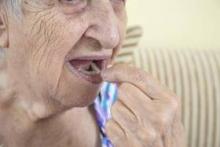Treatment with the estrogen-receptor modulator raloxifene does not significantly improve cognitive function in women with Alzheimer’s disease (AD), results of a U.S. randomized, double-blind, placebo-controlled trial suggest.
The study’s researchers gave (120 mg) oral raloxifene or an identical placebo once daily to 42 postmenopausal women with dementia and probable AD of mild to moderate severity. Of those women, 39 continued to take the drug for the study’s full treatment period of 12 months.
At 12 months, the mean Alzheimer’s Disease Assessment Scale cognitive subscale (ADAS-cog) scores for both the treatment group and the placebo group were modestly lower than mean baseline scores. Dementia rating, function, and behavior also declined by similar amounts in both treatment groups.
Even caregivers’ responses to surveys suggested that both groups of patients had similar outcomes; caregiver burden and caregiver distress increased modestly over time for both groups.
Three of the study’s participants experienced serious adverse events, including one death of a woman who had taken raloxifene. This woman’s death was preceded by her developing pneumonia and heart failure, and an ischemic stroke, which may have been related to her use of the drug, according to Dr. Victor W. Henderson and his colleagues. Also in the experimental group was a women diagnosed with colon cancer. One woman in the placebo group was hospitalized for hallucinations and agitation.
“These results provide information to guide consideration and design of future trials. The essentially null effect of raloxifene on the primary outcomes implies a low likelihood of positive results but does not exclude the possibility of modest cognitive benefit or harm,” according to the researchers.
Read the full study in Neurology.

